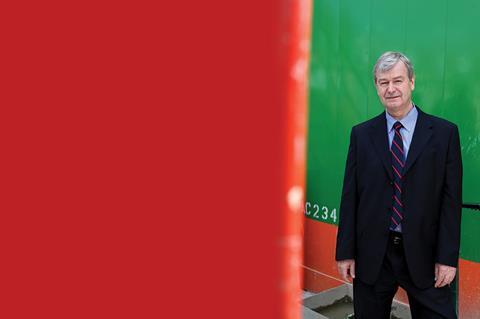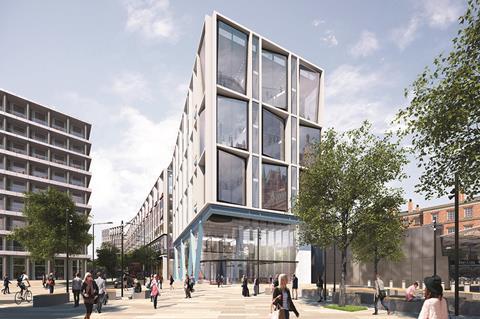Bam Construct UK boss Graham Cash tells Building what winning one of the most prestigious construction jobs of the year means for the contractor

‘This isn’t a normal builder’s presentation,” says Graham Cash, chief executive of contractor Bam Construct UK. Cash stops talking as an animated presentation starts up on a big screen mounted on the wall of one of Bam’s site offices on the King’s Cross Central development in central London. A disembodied commentator takes over the narration. “Imagine if you could build the best building in the world - where would you start?” it asks. “To build something truly groundbreaking you need to start with a very special place; a place with history and a bright future …”
The presentation concludes about five minutes later and is, no doubt about it, pretty slick stuff. Cash, a modestly spoken man not given to hyperbole and without a hint of smugness, certainly looks pleased with it. And well he might. This is, after all, the presentation that helped Bam win the £300m contract to build internet giant Google’s AHMM-designed headquarters in King’s Cross, one of the most coveted contracts to be awarded in the last year. But it could also be the presentation that puts BAM firmly in the top tier of contractors able to bid and win the biggest and most prestigious jobs. So how did Bam, whose largest single contract before this was the £170m Laboratory of Molecular Biology for the Medical Research Council, manage to pull off such a prestigious win? And does the win really buy it a place at the top table?
Bam is certainly not the only contractor to have a slick bid team, but its Google presentation is undoubtedly impressive. For a start, it is clear that its animators studied Google’s irreverent, quirky design style closely in order to come up with something that could have been put together by the company itself. Bam’s bid was then delivered to Google in a plain white box, unadorned with any of the contractor’s usual regalia. Nestled on top of the bid documents was a tablet computer and, when the box was opened, a magnetic strip in the lid automatically started up the device, which immediately began playing the animation. All of the documents in the box could be accessed via the tablet in a maximum of three clicks. Oh, and it goes without saying that the tablet wasn’t manufactured by Apple. As Cash says, not a normal builder’s presentation.
Watch the presentation that Bam sent to Google below >>
This video was produced by Blue Edge.
The outside bet
Cash acknowledges that many in the construction industry were surprised when Bam won the Google job. The £917.2m turnover company, owned by contracting giant Royal Dutch Bam, is no minnow, for sure, but it has not tended to compete for this size of contract, and was up against some of the biggest names in construction: Skanska, Carillion and Balfour Beatty. “I think that people might have viewed us as the outside horse,” he says. “But the way we handled it was about putting the right team together. It wasn’t about Bam - it was about what was right for Google. That team was briefed that we wanted everything to be different, not only in terms of the presentation but in terms of the interview and everything else we did on the project.”
Cash knows what it means for the firm, and says it is part of a deliberate strategy to move the company on: “I’d like to be in the league with the best not the biggest, and I think that the win does do that for us.”
Such was the surprise at Bam’s win, however, that some commentators wondered whether Bam’s relationship with Argent - the development manager and erstwhile developer at King’s Cross from whom Google acquired its development plot - hadn’t played a part in the decision. After all, Bam is already building on several sites on the King’s Cross scheme and has a relationship with Argent going back 20 years. Surely that connection helped?
Cash isn’t having any of it, pointing out that both Kier and Carillion are also on a design-and-build framework on King’s Cross Central. “Kier didn’t make the shortlist and they’ve worked with Argent forever,” he says. “Ourselves and Carillion did make the shortlist, but at the end of the day I think it was down to us and Skanska. So at a different stage a different one of the framework contractors didn’t progress. I think with Google, we just won.”
The team was briefed that we wanted everything to be different, not only in terms of the presentation but in terms of the interview and everything else we did on the project
While the Google job is certainly the biggest - and most attention grabbing - of Bam’s recent wins, it is still only one of many successes that has seen the company beat the market in the last financial year. Its turnover may have dropped from £945.9m in 2011, but operating profit was up in 2012, from £9.6m to £13m. Given the state of the market, that counts as a success story.
Cash reckons that activity in the markets in which Bam operates has dropped by 30% since 2008. “But our turnover has only dropped by 15%, so we’ve been able to hold a steady position,” he says. “But it’s not about turnover because I think that turnover in this market is vanity. In profit terms, I think that anybody who is doing 1% or 2% is doing well right now.”
Bam’s relatively robust financial performance can be attributed to a range of factors, Cash believes. While many of the company’s competitors sought to diversify the services they offer, Bam “stayed firm and solid behind what we did”. It is also clear that Bam’s bidding strategy has held it in good stead through avoiding clients that are simply seeking the lowest bid regardless of quality.
“We’ve been very careful about the company that we keep,” says Cash. “We’re sometimes economical, but on some recent projects we’ve won from third or fourth place on the price ranking because the team we sent in knew the project inside out and offered an excellent service.”

Keeping it local
Cash also repeatedly returns to Bam’s structure when talking about the company’s project wins and its wider financial performance. In contrast to other contractors such as Balfour Beatty and Kier, which have been cutting and rationalising their regional offices, Bam had seven regional offices going into the recession and Cash is confident that it will have seven offices when the UK market eventually throws off its woes. The regional offices are supported by sector leads in head office - or in the case of schools in the Leeds office - who bring market-specific understanding to bear on bids.
The combination of local and sector expertise, Cash says, is crucial. “I can’t tell you how important our regional offices have been to our bottom line,” he says, adding that a consistent presence puts Bam in a strong position when bidding against contractors that open and shut offices based on the vagaries of a local economy. “If you take the West Country, other contractors have migrated in and out and the local market knows that. We’re in for the long term. You’ve still got to deliver, but it helps us when everybody starts the musical chairs: in, out and the client doesn’t know what you’re about.”
Bam’s recent win on the Graphene Institute, a £61m research building for the University of Manchester, is a case in point. “The Graphene building was a very tightly fought race - it was down to us and Laing O’Rourke,” he says. “And if you think about what I said about us bidding for things regionally and others bidding centrally, there’s a message in that for you about that project.”
Add to the Google and Graphene wins £226m worth of academies work from the Education Funding Agency and Cash says Bam has already secured around £800m of work this year, which, only six months into the year and on an annual turnover of around £900m, is pretty good going. Having said that, last week’s news that developer Derwent had put its £150m redevelopment of the former Saatchi & Saatchi offices in London’s Fitzrovia on hold, can’t have come as good news for Bam. Already engaged in a pre-construction capacity, the firm had been tipped for the job. Cash says he is unable to comment.
However, Cash is quietly confident about the future. He says his team is working on bids for the Priority School Building Programme and that “there are a lot of things layered in our business in terms of what we’re looking into at any one time”. However, he is circumspect, preferring to trust in his team to deliver rather than promising the Earth. “There are still hard times to come,” he says. “I think we’ll weather the storm better than most, and the last few years have shown that. But irrespective of what comes, if you’ve got people who are happy and focused, that’s a pretty good recipe.”



























No comments yet